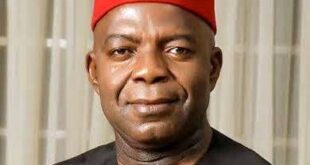Environment Advocate and director of Health of Mother Earth (HOMEF), Nnimmo Bassey, who was in Bayelsa State penultimate week end said he was in the oil rich and “ecologically devastated” state to drum up support and awareness for the sustenance, especially of the Niger Delta region.
At an event, held in Agbia, Yenagoa Local Government Area, where enthusiastic and committed participants drawn from various oil spill impacted communities came out en mass to listen to the HOMEF team, Dr Bassey lampooned the Shell Development Company of Nigeria, SPDC, for saying that after decades of oil exploration and exploitation in the Niger Delta, the region is no longer viable for economic activities, and it is now shifting its activities offshore.
He stressed that “SPDC’s latest position means it is taking pollution offshore.”
The Royal Dutch Shell had reportedly disclosed that it has contacted the Nigerian government about its desire to divest its onshore holding through its onshore joint venture, SPDC, citing increased oil spills it has experienced in the Niger Delta region of recent through pipeline sabotage and other issues relayed to onshore operations.
The company’s chief executive officer, Ben Van Beurden in one of the company’s annual meeting had said “We cannot solve community problems in the Niger Delta, that’s for the Nigerian government perhaps to solve. We can do our best, but at some point in time, we also have to conclude that this is an exposure that doesn’t fit with our risk appetite anymore”
However, Nnimmo Bassey in his reaction said there is the need for the people of the region to speak out, adding that before they divest and carry their operations offshore, they must first clean up the pollution they caused before selling off their assets and liabilities.
He disclosed that the essence of the workshop at Agbia was to sensitize communities on the dangers associated with oil pollution and how people should mobilize to tackle the challenges. He said a lot of foreigners engaged in illegal fishing in the high sea without being checked.
“There is the need to protect the environment and put a stop to illegitimate activities along the coast of Niger Delta. The Niger Delta has several freshwater and marine ecosystems like the rivers, lakes, streams and creeks”.
He said, before the onslaught of sixty years of unrelenting oil pollution, there was an abundance of fish species in both fresh water and the marine ecosystems. But today, many of these fish species are endangered due to constant pollution and some are going extinct.
“The head of SPDC, was recently quoted as saying, that the Niger Delta no longer suites their business model. On this account, he said they were moving from onshore to deep waters offshore. They are going offshore in order to avoid responsibilities for their continued environmental misbehaviour in our communities. They are heading offshore after committing ecocide onshore. They are shifting offshore after sucking the land dry and thrashing whatever they came across. Above all, the hope of our fishers remains in the fish that pollution has driven offshore and now the polluters are threatening to take their business there.
“If transnational oil companies replicate their prodigious pollution offshore, the fishers, the people and communities of the Niger Delta region will be totally stranded on both land and sea. That is the definition of disaster. Besides shifting pollution offshore, our fishers will face the hazards of security forces condoning off oil installations and at the same time be confronted by the largely unchecked activities of sea pirates,” he said.
Bassey noted that “while talking of sea pirates, we must not forget the activities of illegal fishing fleets scouring and sweeping our continental shelf. Their nefarious activities are known to be heavily depleting the fish stock in the Gulf of Guinea.
“Added to the reported sale of a protected coastal territory to the Chinese by the Sierra Leonean government for the establishment of fish meal factories, we can be sure that they literally make mincemeat of what remains of the fisheries of the region. It is time for the Economic Community of West Africa states (ECOWAS) to wake up and call sleepy littoral nations in the region to order. Colonial extraction of resources, whether fish, minerals or timber must be halted and the interest of our fishers and communities protected.
“Today we sit on the shoulders of Taylor Creek that was teeming with fish. We can imagine what a joy it was for our people going to fish with traps, nets, and other gears and returning with bountiful catch. Today, the stories are tainted by oil spills, gas flares and toxic wastes and are largely different from what it was before the oil rigs plunged into the belly of our land.
“We believe that fishers are custodians of vital cultural values. Our fishers are frontline protectors of our aquatic ecosystems. They are also the first to be affected when the ecosystems are damaged. They are equally in the best position to monitor and report these harmful incidents and insist on remediation and restoration as well.
“They must stand with our communities to insist that even if the oil companies sell their onshore fields to Nigerians firms, they must retain their liabilities. Our people must refuse to be dribbled by companies that are driven by nothing but profit. There are reported cases of transnational oil companies selling onshore facilities to Nigerian firms and simply walking away from the mess they had created We hear that they claimed that they had sold everything and questions should be directed to the new “owners;” they claim they know nothing of old pollutions; and the questions must be put to the company that had walked away, communities must refuse to be stranded by being treated as pawns by corporations that care nothing about the environment and the people,” he said.
The HOMEF director argued that “Our future is connected to the sea. We are concerned about the future of our people as oil and gas business begins to fade, as the world transits from dirty energy to clean energy. We need the transition, but in the process, new harms must not be uploaded on our people.
“Government has the responsibility to quickly review its business approaches in the sector and ensure that the operators bear the responsibility for ecological destruction wreaked on our territories. Government must also support our fishers with fishing equipment, modern landing points, processing facilities and fish markets.
“As the petroleum civilization slides into its twilight zone, or injury time, a mapping of the ecological devastation in the Niger Delta must urgently be carried out. This must be followed by a Niger Delta wide cleanup and restoration exercise, with special attention paid to the Taylor Creek. There is no better way to mark the World Environment Day than to commence on a complete detoxification of the Niger Delta. We cannot afford to imagine a Niger Delta without fish,” Bassey said.
 PH Mundial – Port Harcourt Online Newspaper News Across The Region
PH Mundial – Port Harcourt Online Newspaper News Across The Region





